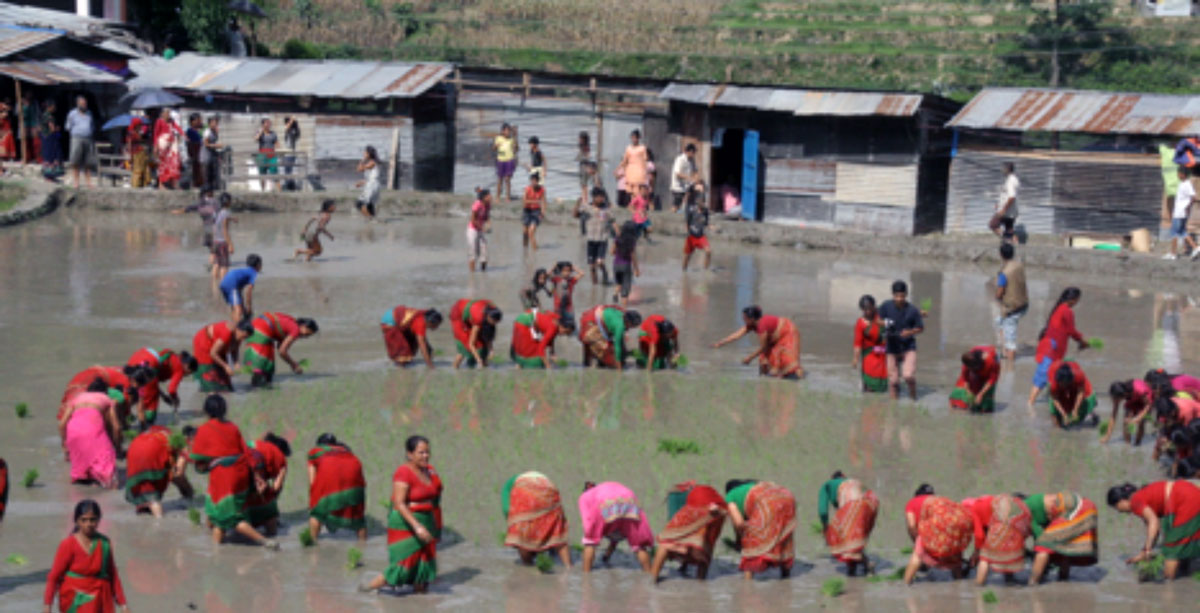Bhuwan Thapa - CLIMAS Climate & Society Fellow
Bhuwan Thapa is a 2015 CLIMAS Climate & Society Graduate Fellow. He and the other graduate fellows (C. Greene, E. Magrane, & V. Rountree) will present the results of their fellowship work on Friday Nov 20, at 10:30 a.m., in ENR2, Room 604.

Figure1: Community members in Tupche VDC, Nuwakot celebrating Rice Plantation Day within two months of the earthquake event (Source: B. Thapa, June 30, 2015)
How farmers are responding to Gorkha Earthquake, climatic and socioeconomic changes in Nepal
Following the Gorkha earthquake in April 2015, many able farmers in the hard-hit Nuwakot district came together and repaired the damaged irrigational canals. They contributed labor and financial resources and where necessary procured additional funding from government institutions. Though some systems could not be repaired immediately due to lack of human and financial resources, the farmers demonstrated the power of collective action in responding to national disasters.
One of the uniqueness of Nepalese irrigation system is the farmer-managed irrigation system where farmers take the responsibility of the overall irrigation management including operation and maintenance. Indeed during the field trip of summer 2015, I learned that these institutions were pivotal in responding to multiple stresses resulting from natural disasters, climatic and socioeconomic changes.
Over the years, stresses on agriculture and water management have materialized in various ways. The monsoon has become erratic causing unpredictable rainfall with variable timing and intensity. The crops are infected with new diseases due to agricultural practices and warmer temperature. The increase in labor price due to massive labor outmigration in Arab countries and high fertilizers price have made some crop varieties economically unviable. These changes have serious implications on irrigated agricultural productivity and wellbeing of thousands of farmers subsiding on agriculture.
In response, the farmers have addressed these challenges through different strategies. In order to supply additional water during shortages, they have installed water pumps to lift river water to up to 50 feet high and distribute through existing irrigation distribution system. In areas where augmenting additional water is not an option, farmers have switched to less water demanding crops. Most of the farmers now use hybrid varieties that produce high yield for less water.
These diverse interventions implemented by farmers have provided me with valuable insights on on-the-ground climate change adaptation. When provided with right incentives and resources, farmers have demonstrated effective adaptive responses through structural and non-structural interventions. Some of the structural interventions included adoption of technology and hybrid seed varieties whereas non-structural interventions were the modifications of water management rules and changes in agricultural practices based on local knowledge. I have learned that the local level institutions with decentralized decision making can be the platform for adaptive responses. These institutions can be crucial for resiliency of irrigated agriculture because they empower the farmers and strengthen their capacity for timely response during crisis.
I have immensely benefited from knowledge-coproduction model that I applied in this research. I incorporated farmers’ group as the valuable partner with repository of local knowledge on adaptive responses. They shed light on multi-faceted dimensions of climate change and provided feedback on my findings which helped me align my research questions on the areas that are more relevant to them.
The research was conducted during summer of 2015 with support from CLIMAS fellowship and ICIMOD HI-AWARE project. Comprehensive study on climate resilient irrigated agriculture in Gandaki River Basin in Western Nepal will be conducted as a part of my PhD research funded by ICIMOD HI-AWARE project.

